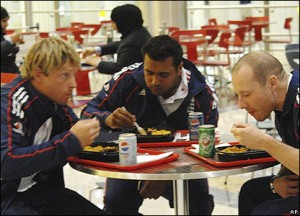
A gradual but inevitable descent into cricket-based loathing and bile.
All Ramdin With No Place To Go: Denesh And The Spirit Of Cricket
One of the main stories to emerge from the first week of the Champions Trophy has been the suspension of Denesh Ramdin for two ODIs, augmented by him being fined his match fee, for claiming a catch that had already been grounded. The ICC described it thus:-
“Ramdin was found to have breached Article 2.2.11of the ICC Code of Conduct for Players and Player Support Personnel (the Code) which relates to “conduct that is contrary to the spirit of the game.”
Hurrah!
(Incidentally, the guidance note to that particular Article states:-
“Article 2.2.11 is intended to be a ‘catch-all’ provision to cover all types of conduct of a serious nature that is not (and, because of its nature, cannot be) adequately covered by the specific offences set out elsewhere in the Code of Conduct. See guidance notes to Article 2.1.8 for examples of conduct that may (depending upon the seriousness and context of the breach) be prohibited under Article 2.2.11.”
And the mentioned guidance notes to Article 2.1.8 include:-
“a) the use of an illegal bat or illegal wicket-keeping gloves; (b) deliberate time wasting; (c) cheating during an International Match, including deliberate attempts to mislead the Umpire; (d) failure to comply with the provisions of clause 7.1 of the ICC Standard Test Match, ODI and Twenty20 International Match Playing Conditions; and (e) any conduct which is considered ‘unfair play’ under Law 42 of the Laws of Cricket.”
The Spirit of Cricket is a funny old bugger. The spirit of the game is enshrined as the preamble to the laws and echoes in its pages. And it’s a theme that runs through the game through all levels and all locations.
Yet cricket is not a game that is equal: it is a long way from the middle at Lord’s to a Lahore park, just as a street game with rudimentary bat, stumps and a makeshift ball is metaphorically miles from the IPL or Champions Trophy. In addition to the laws there are myriads of regulations for professional competitions; at club level there are local rules and to go to the extreme, informal games might adapt, replace or ignore many of the laws completely – hit and run cricket, one-hand-one-bounce cricket, Barrington rules, whatever you and the other players agree. So long as it is the same for both sides. Or not, as anyone who has played on a beach as the tide comes in will testify. But whatever context a particular group of players choose to play in, the Spirit of Cricket should hopefully still apply. That is the leveller.
The spirit of the game could be seen as outdated in the modern, professional era; a sham that is a pointless relic from the amateur age. Aren’t the laws enough without a concept of spirit? Others might argue such a view to be jolly rotten and that a sense of fair play is needed above all else and that without the principle, all other laws and regulations lose their meaning. Personally, I would hope that any player with a gram of morals about his or her person would be haunted by any action from their past that would be contrary to the spirit of the game (confession time: I still feel bad about claiming a catch in a field next to my house when I knew I shouldn’t have – I wouldn’t have been older than ten at the time). Yet we read about those allegations in the IPL – and those that have taken place in England – and are saddened and hurt, not just by the actions, but by the apparent lack of remorse.
Claiming a catch is obviously very different from fixing or bribery – it won’t attract a criminal record that’s for sure – but they are related nonetheless. When Ramdin picked the ball of the ground and ran off to his celebrating teammates, he was cheating to improve the standing of his team and not for the financial reward that comes with fixing. He might not have taken a logical and determined thought process to do it, because instinct was probably the more likely cause for his actions. But with time, just a few seconds worth of time, he would have realised his error. And he chose not to rectify it, even despite the all-seeing cameras (not that the existence of cameras should matter). Guilty, in our eyes, and the punishment probably fits the crime (ten years ago Rashid Latif was banned for five matches for claiming a grounded catch, which Mike Proctor determined to be a Level Three offence – a greater offence than Ramdin’s which was Level Two)
A few other comparisons, perhaps? The example that was countered most often on social media this week was that of a batsman who doesn’t walk when he knows he has hit the ball. A divisive topic for sure and one that will probably never be resolved satisfactorily, at least not until magic bats and balls that light up or make a bleeping noise when they contact each other (NB: where’s the local patent office?). Although in my view the differences between the circumstances are significant, I would suggest a batsman not walking is contrary to the spirit of the game, but far less demanding of punishment and also far harder to prove.
Another example that comes to mind was that of Paul Collingwood, who when England captain, declined to withdraw an appeal when Ryan Sidebottom flattened Grant Elliott. He did apologise afterwards, but hopefully Collingwood feels the guilt still, as much as we love him and his gingery grin. On the other hand, there was MS Dhoni recalling Ian Bell following the batsman’s dozy departure for tea two years ago. Dhoni was lauded for deciding to forgo the dismissal and actually won the ICC’s Spirit of Cricket Award (two additional points of debate would be: should Dhoni have appealed in the first instance and should Andy Flower and Andrew Strauss not have accepted it was Bell’s mistake rather than go storming off to complain and protest during the tea break?).

Ian Bell just about managed to get a small portion of lasagne before Samit filled his special large plate for the second time.
Finally, as an aside but one related to Ramdin’s case, the member of the Elite Panel of ICC Match Referees appointed to adjudicate the case was Chris Broad. A respected figure for sure, but also the father of one of the most petulant cricketers around, one who is also playing in the same tournament. Is that a conflict of interest?
Fuck, we don’t know the answer – to that or to the wider issue about the spirit of the game. We’re not entirely sure how ‘spirit’ can be defined, especially if it is to be used in punishments and appeals. The laws attempt to, but it is open-ended and open to considerable debate – which in itself at times adds to the joy of cricket, as well as causing exasperating and tedious arguments.
What we do know however is that when a kid is playing in a Port-of-Spain park or at school in south London, we really wouldn’t want him to claim a catch that he knew he had grounded; it is a different context completely to Ramdin’s offence, but the same Spirit of Cricket.




No Comments
Post a Comment